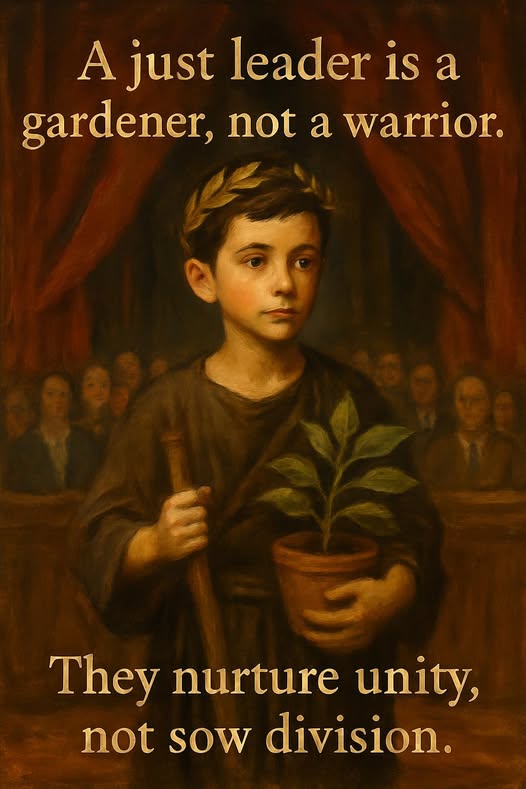
(Political power is a sacred trust, not a personal prize—it is a test from the Almighty)
The classroom was buzzing. The students of the civic studies club had been tasked with preparing a mock parliament. Roles were drawn: ministers, press, public.
But only one was chosen to play the Leader of the Nation.
It was Emil.
He froze as the teacher handed him the scroll. “Why me?” he whispered.
“You’ll understand soon,” the teacher said.
That night, Emil walked home quietly beside his grandfather. “I don’t want to do it,” he muttered. “It’s just a game, but it doesn’t feel like one. What if I mess up?”
His grandfather stopped walking. “Let me ask you something,” he said. “What do you think political power is?”
Emil shrugged. “A responsibility?”
“Yes” the old man said. “But it’s also a test. A profound one. One of the few that reveals a person’s soul.”
They sat under the pomegranate tree in their backyard.
“Listen, Emil,” the grandfather continued. “Power from the people is not a blessing to be celebrated—it’s a sacred trust from the Almighty. The nation is not a crown to wear, nor a property to own. It’s a garden entrusted to your care. You may sit in a high chair, but your job is to bend lower, to serve with humility.”
“But politics is messy,” Emil said. “People raise slogans, fight, divide, shout about enemies and traitors. It’s always about revenge or defense.”
The old man nodded. “That’s because most politicians forget the purpose of power. They treat leadership like a battlefield. But there’s a difference between politicians and generals. Generals divide—label friends and foes, draw lines, launch wars. That’s their training. But a real politician is different. A just leader does not draw lines in the sand. He erases them.”
Emil sat quietly, absorbing every word.
“A great leader never builds their strength by sowing chaos or exploiting fear,” the grandfather continued. “They don’t win by division. They win by identifying the forces within society—prejudices, tensions, needs—and creating unity among them.”
He pointed toward the horizon.
“A corrupt leader exploits the people and makes the nation about themselves. But a just one? A just one rules like a gardener. They nurture. They accept critique like rain. They don’t cut down trees for their own gain. They govern with integrity and transparency. They listen—not just to applause, but to petition and protest.”
Emil looked down. “But I’m just a kid. What can I do with all that?”
“You begin by understanding the torch you’ve been handed. Power is not a throne. It’s a flame. It can light the way—or burn everything down.”
“And what about those who only want the position for pride?” Emil asked. “People who lie, cheat, and divide others just to win?”
“They are unworthy,” the old man said firmly. “Public office is not a place for the greedy. True justice cannot flow from a selfish heart. If someone clings to power to silence the truth or to benefit their own kind—by race, color, religion, or ideology—they are not serving God. They are failing the test.”
There was a long silence. A breeze rustled the tree branches.
Finally, Emil nodded.
“I think I understand now. The game tomorrow… it’s not just pretend.”
His grandfather smiled.
“No, it’s not. You pass the test of power not when you gain authority… but when you refuse to abuse it.”
Emil sat quietly, the weight of his grandfather’s words settling into him like roots.

